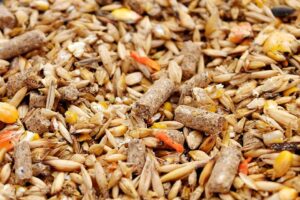
Investment company EFI Group, founded by Igor Lisky, together with its partners, has announced the start of construction of the Feednova Center (Feednova TM) plant for the production of high-protein feed additives and animal fats in the Cherkasy region.
“Despite the war, Ukrainian businesses are investing EUR 14.4 million in the first phase of the project. Total investments are planned to exceed EUR 20 million,” according to a press release on Tuesday.
According to the release, the majority investor is EFI Group, together with its strategic partner, leading Dutch and Danish manufacturers of technology and equipment in the processing industry.
The enterprise will include four production lines that will allow processing more than 150 tons of raw materials per day and producing more than 50 tons of finished products: meat and bone meal, feather meal, blood meal, and animal fats. The plant is scheduled to launch in the third quarter of 2026.
According to Samvel Ramazyan, director of Fidnova Center LLC, the design of the plant has already been completed and a general contractor has been selected, whose name is not disclosed in the release.
The Ministry of Economy, Environment, and Agriculture said in a press release on Tuesday that Fidnova Center will be the first project in Ukraine to receive compensation for the cost of constructed engineering and transport infrastructure facilities as early as 2025, with the total amount of state support estimated at UAH 172.1 million.
To date, the Ministry of Economy has provided the investor with a conclusion on the feasibility of the project, and the order to sign an agreement between the state and the investor is currently being approved by the central executive authorities. An agreement between the investor and the state will be signed in the near future, the ministry said.
The new facility will be the second plant under the Feednova brand after the successful launch of the first plant in the Lviv region in 2021, according to the release. The company exports more than 80% of its products to EU countries and continues its own development through the introduction of new production lines and the implementation of energy efficiency projects.
“The second plant for the production of high-protein additives is critically important for the modern meat processing industry. We are creating an infrastructure for efficient processing that simultaneously reduces environmental risks, creates jobs, and generates added value within the country. The Cherkasy region is the ideal location for this plant: it has strong agricultural enterprises, logistics, and, most importantly, the support of the local community,” Liska said in the release.
It is noted that the enterprise will create more than 80 jobs in the community and should influence the development of agro-industrial complexes in the region, as it will be the first in the central part of the country to process raw materials from external suppliers.
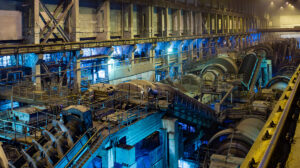
Due to the full-scale war, the mining and metallurgical group Metinvest reduced its annual revenue from $10-12 billion to $5-6 billion, while remaining a profitable company, its CEO Yuriy Ryzhenkov said in an interview with the British newspaper The Times.
The war has significantly affected the financial performance of Metinvest, which sells a significant portion of its metal products in Ukraine and exports iron ore, flat-rolled products, and semi-finished products to 51 countries, including China, India, and the US.
According to Ryzhenkov, “before the war, the business usually had an annual income of $10-12 billion, and now this figure is around $5-6 billion. Despite this, the company remains profitable, and the CEO considers the impact of Trump’s tariffs to be insignificant.”
At the same time, it is noted that Metinvest’s largest enterprises were bombed and put out of operation, including the Mariupol metallurgical plants, which were one of the first battlefields. Metinvest’s revenue has halved, and its workforce has shrunk to around 50,000. Tens of thousands of people have lost their jobs at the group’s enterprises; 8,000 are now serving in the Armed Forces, and 764 employees have been killed.
Despite these losses, top management has managed to keep those who remained in the company motivated. Metinvest is one of the largest private donors to the Ukrainian army, and its steel is used for shelters and military equipment.
“Employees feel that they are part of the resistance. And they are proud of it,” said the CEO.
Metinvest is a vertically integrated group of mining and metallurgical enterprises. Its enterprises are located in Ukraine—in the Donetsk, Luhansk, Zaporizhzhia, and Dnipropetrovsk regions—as well as in the European Union, the United Kingdom, and the United States. The main shareholders of the holding are SCM Group (71.24%) and Smart Holding (23.76%). Metinvest Holding LLC is the managing company of the Metinvest Group.
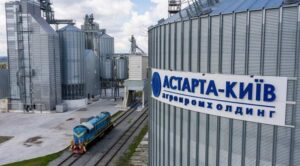
Astarta, Ukraine’s largest sugar producer, intends to continue investing in the construction of its soy protein concentrate plant in 2026. These investments will amount to approximately EUR40 million, said Vyacheslav Chuk, director of commercial operations and strategic marketing at the agricultural holding.
“Our budget process is not yet complete, but the agricultural holding will definitely invest in the completion of our new project to build a soy protein concentrate plant. This is about EUR40 million, and the rest is maintenance, which will vary depending on what we focus on,” he said at the Forbes Agro 2025 conference in Kyiv on Friday.
Responding to a follow-up question about how much Astarta will invest during the year to resolve current issues, Chuk said it could be tens of millions of dollars.
In 2024, Astarta began investing in the construction of a plant for processing soybean meal into soybean protein concentrate with a capacity of 500 tons/day (about 100,000 tons per year) in the Hlobyn industrial complex (Poltava region). The agricultural holding is investing more than EUR 76 million in the purchase of equipment and technologies and will create 110 new jobs.
Astarta and its structural unit Astarta Agro Protein signed the first investment agreement with the Ukrainian government to receive compensation from the state for significant investments. Under the agreement, the state will provide the agricultural holding with a number of incentives, including exemption from import duties on new equipment, import VAT on new equipment, and income tax for up to five years.
Astarta is a vertically integrated agro-industrial holding company operating in eight regions of Ukraine and is the largest sugar producer in Ukraine. It comprises six sugar factories, agricultural enterprises with a land bank of 220,000 hectares, dairy farms with 22,000 head of cattle, an oil extraction plant in Hlobine (Poltava region), seven elevators, and a biogas complex.
In the first nine months of 2024, Astarta increased its net profit by 35.1% compared to the same period in 2023, to EUR75.60 million. The agricultural holding’s revenue grew by 12.6% to EUR441.46 million, and EBITDA by 12.8% to $131.56 million.
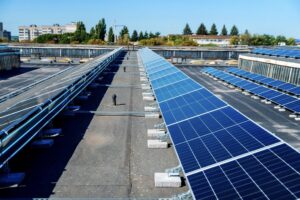
A large Ukrainian manufacturer of heating devices and equipment for heating systems (TM Termia), JSC Vinnytsia Mayak Plant, has installed its own solar power plant (SPP), according to Andriy Ocheretny, deputy head of the Vinnytsia City Council.
“The SPP was launched on September 19, 2025. A total of 384 solar panels were installed. The peak capacity is 236.16 kW,” he wrote on Facebook on Thursday.
As specified by City Council Deputy Vyacheslav Terlikovsky, the enterprise took advantage of the Vinnytsia City Council’s program to compensate for the cost of equipment from renewable energy sources.
According to him, the installation of the SES was carried out by Promavtomatika Vinnytsia LLC, which will also provide further maintenance.
The Mayak plant, under the Termia trademark, manufactures, among other things, air heating units (heat guns, fan heaters, air curtains), electric convectors, electric boilers, and heating radiators.
According to the company’s annual report on its website, in 2024, its consolidated net profit decreased by 2.4 times compared to 2023, to UAH 7.6 million, and net income decreased by 10%, to UAH 251.6 million.
Ocheretny also reported that an application for compensation from the Vinnytsia City Council for the purchase of equipment for the production of electricity from renewable sources was submitted by PP “Konex,” which specializes in the trade of pharmaceutical products.
“PP Konex now also has its own solar power plant with a total capacity of 60 kW. In total, 108 panels (560 W each) and 20 storage batteries (5.12 kW each) are installed on the roof of the enterprise,” he wrote.
According to its website, the Konex pharmacy chain has more than 200 pharmacies in the Vinnytsia, Khmelnytskyi, Chernivtsi, Cherkasy, Kirovohrad, Zhytomyr, Ivano-Frankivsk, Kyiv, Rivne, Ternopil, and Odesa regions.
According to its report, Konex earned UAH 51.8 million in net profit and UAH 3.5 billion in revenue in 2024.
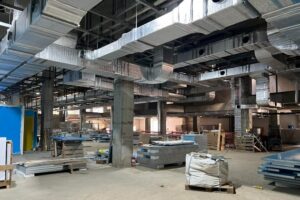
Biopharmaceutical company Biopharma (Kyiv) has completed construction of a new pharmaceutical plant in Uzhhorod.
This was announced by Dmytro Kysilevsky, deputy chairman of the parliamentary committee on economic development.
“Biopharma Plasma has completed 80% of the construction of a plant for the production of blood plasma-based medicines in Uzhhorod. The industrial premises have already been fully built, the construction and connection of the energy infrastructure has been completed, and the installation of production equipment will begin in October,” he wrote on his Facebook page.
Kysilevsky specified that commissioning work at the plant is scheduled for late 2025-early 2026, with the launch of the first stage of production planned for the first half of 2026.
According to the plan, the volume of blood plasma-based drugs produced in Uzhhorod will be twice that of Bila Tserkva, amounting to 1.5 million liters of blood plasma per year.
Construction of the Biofarma Plasma plant in Uzhhorod began in the fall of 2024. The planned investment in the new production facility is approximately €80 million. The company’s Uzhhorod plant will focus on exports.
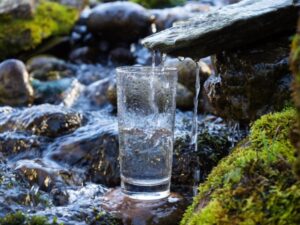
The European Bank for Reconstruction and Development (EBRD) will provide a long-term secured loan of EUR11 million to Karpatski Mineralni Vody LLC (KMV) from the group of the same name to finance the construction and commissioning of a new beverage production plant with an effective capacity of 200 million bottles per year in the Lviv region.
“The use of modern equipment at the new plant will significantly increase resource efficiency compared to the existing plant. The project will increase the Group’s competitiveness, production efficiency, and environmental performance,” the bank said on its website.
According to the information, the EBRD Board of Directors approved the loan on August 5, and the next step will be the signing of the necessary documents.
It is noted that the total cost of the project is EUR24 million.
KMV LLC is a manufacturing company of the KMV Group, one of Ukraine’s leading producers of non-alcoholic beverages, producing mineral water, flavored mineral water, other non-alcoholic and energy drinks, as well as snacks, the EBRD noted.
According to the project, the group will have to conduct a comprehensive hydrogeological study during the first three years of operation to assess the permissible volume of water intake for the future, as well as ensure automatic monitoring of water intake and groundwater levels at its wells.
The project provides for a first loss guarantee provided by the European Union through the Ukraine Investment Framework (UIF), and the costs of external pre-investment legal and environmental and social analysis will be partially covered by the Japan-EBRD Cooperation Fund.
In addition, KMV is expected to receive a grant under the EBRD’s Human Capital Investment Incentive (HCII) program to cover up to 50% of eligible costs related to improving workplace accessibility and upgrading equipment and infrastructure. It is expected that the grant funds will be allocated from the Japan-EBRD Cooperation Fund or provided by a Taiwanese donor. The project is also expected to receive a FINTECC grant under the EU4Climate program for the purchase of energy-efficient bottling equipment.
According to data from YouControl, KMV LLC increased its revenue by almost 2.3 times in the first half of 2025, to UAH 277.20 million, and its net profit by 8.2 times, to UAH 140.69 million.
The beneficiaries of the company are listed as Serhiy Petrovych and Petro Ivanovych Ustenko, who own 83.77% and 16.23%, respectively.
The revenue of Serhiy Ustenko’s KMV Trading House LLC for the first half of this year increased by 18.5% to UAH 1 billion 71.47 million, while net profit decreased 2.4 times to UAH 61.17 million.
According to the Karpatski Mineralni Vody website, the company began operating in the mineral water market in 1996 with the first bottling of Karpatskaya Dzherelna natural mineral table water, and in June 2002, it was reorganized into a plant for the production of mineral water and non-alcoholic beverages, Karpatski Mineralni Vody. In 2002, the company began producing sweet carbonated beverages under the TM “Fruktova Dzherelna” and TM ‘Sokovinka’ brands, and in 2016, the energy drink TM “Dragon”.